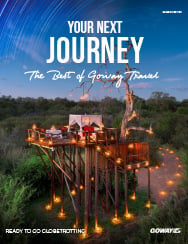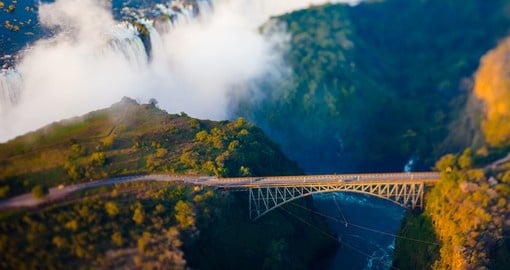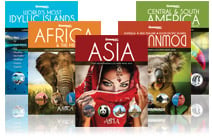Zimbabwe History
Since the 5th century, Zimbabwe was occupied by Khoisan-speaking hunters and gatherers. These people were forced to retreat to the southeast when settlers of Bantu origin arrived from the north in the 10th century. By the following century, powerful Shona dynasties were established in present-day Masvingo. These dynasties left a lasting impact on the culture of the country with the ruins of Great Zimbabwe, the capital city of the Kingdom of Zimbabwe during the country’s Iron Age.
The 16th century witnessed the arrival of Portuguese traders, however, by this time, the Great Zimbabwe society was in ruins and the Shona dynasties had split into autonomous states. In 1830, Ndebele people came to Zimbabwe from the south and their chief, Mzilikazi established the capital at Bulawayo. Later, Lobengula, Mzikikazi’s son began putting up resistance to British settlers. Colonial entrepreneur Cecil John Rhodes formed the British South Africa Company in 1888, and set about colonizing Zimbabwe. By 1895, the land had become a new country called Rhodesia and as emigration began to intensify, so too did relations between settlers and the native populations.
The 1950s and 1960s were periods of change in Rhodesia as two political parties were formed, the Zimbabwe African People’s Union (ZAPU) and the Zimbabwe African National Union (ZANU). Both parties were banned and leaders were imprisoned, these restrictions led to a Chimurenga, a bloody bush war between colonists and freedom fighters that lasted until the 1970s. Rhodesia became independent in 1980 and the name was changed to Zimbabwe. Robert Mugabe, the ZANU candidate became the first prime minister. Rivalries between the two political parties that had existed before independence began to reemerge resulting in disaster and destruction in Zimbabwe.
Fearful over ZAPU rebels, Mugabe sent his Fifth Brigade into the heart of the country culminating in a terrible massacre that saw the death of thousands of civilians. These atrocities were ignored by the world, and despite a peace agreement, Zimbabwe embarked on a one-party state. A new political group The Movement for Democratic Change (MDC) mustered some hope for change with the upcoming election, and Mugabe was very worried. In response, he initiated threats of violence, voter intimidation and a land reform programme. MDC lost the election by only four votes.
Presidential elections two years later followed the same pattern, and in some ways, were greatly intensified, again resulting in a Mugabe win. The president was furious that white landowners had supported the opposition and so he began to confiscate land to give to African farmers. While certain land reforms were necessary and some farmers genuinely tried to work their land, others simply raided the farms and left the properties vacant. In 2005, Mugabe began his Murambatsuina (drive out the trash) campaign which directly targeted the poor. He began to deurbanize cities, forcing people back to rural areas where the government could control food supplies. Homes were destroyed and approximately one in five Zimbabweans were affected.
In 2009, opposition leader Tsvabguraum of the MBC signed a coalition deal with Mugabe, making Tsavbguraum the Prime Minister. This agreement was a significant step in Zimbabwe’s history, however, there are still many obstacles to overcome. Mugabe has said he will run in the 2013 election and the country is still very poor. Despite this, there have been improvements since 2009. External reports have suggested that the living conditions in Zimbabwe have improved on a wider front and the United Nations stated that there has been progressing in the humanitarian situation. There is so much to see and do throughout the country and there is hope that tourism numbers will return to the heights experienced in the 1990s. The economy is slowly recovering and Zimbabweans, as well as the world, waiting to see what 2015.
Zimbabwe Travel Information
At Goway we believe that a well-informed traveller is a safer traveller. With this in mind, we have compiled an easy-to-navigate travel information section dedicated to Zimbabwe.
Learn about the history and culture of Zimbabwe, the must-try food and drink, and what to pack in your suitcase. Read about Zimbabwe's nature and wildlife, weather and geography, along with 'Country Quickfacts' compiled by our travel experts. Our globetrotting tips, as well as our visa and health information, will help ensure you're properly prepared for a safe and enjoyable trip. The only way you could possibly learn more is by embarking on your journey and discovering Zimbabwe for yourself. Start exploring… book one of our Zimbabwe tours today!
Extend Your Trip
After your Africa tours, why not consider one of Goway's Europe tours or Egypt tours en route from Zimbabwe or perhaps a stopover in Dubai on one of our United Arab Emirates tours
Book your Zimbabwe tour with Goway!
 AfricaExperts is the exclusive division of Goway that specializes in planning and organizing Zimbabwe tours and experiences. Choose from an exclusive African safari, an independent travel module, a city stopover, a stay of distinction, a luxury rail journey and more. We want to be your first choice when next you go globetrotting to Zimbabwe.
AfricaExperts is the exclusive division of Goway that specializes in planning and organizing Zimbabwe tours and experiences. Choose from an exclusive African safari, an independent travel module, a city stopover, a stay of distinction, a luxury rail journey and more. We want to be your first choice when next you go globetrotting to Zimbabwe.
Get a Trip Quote Order a Brochure

















